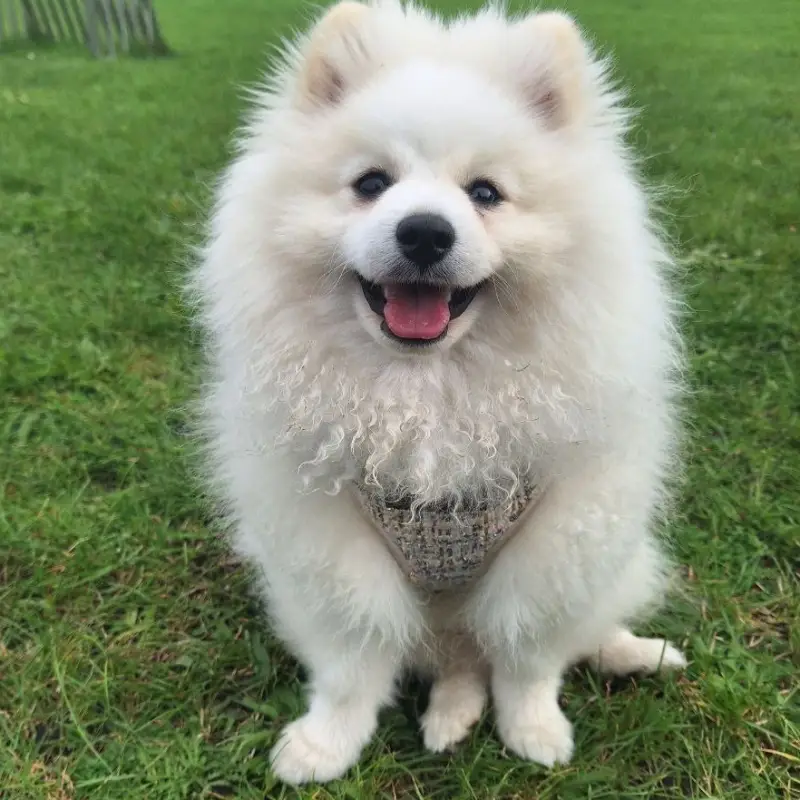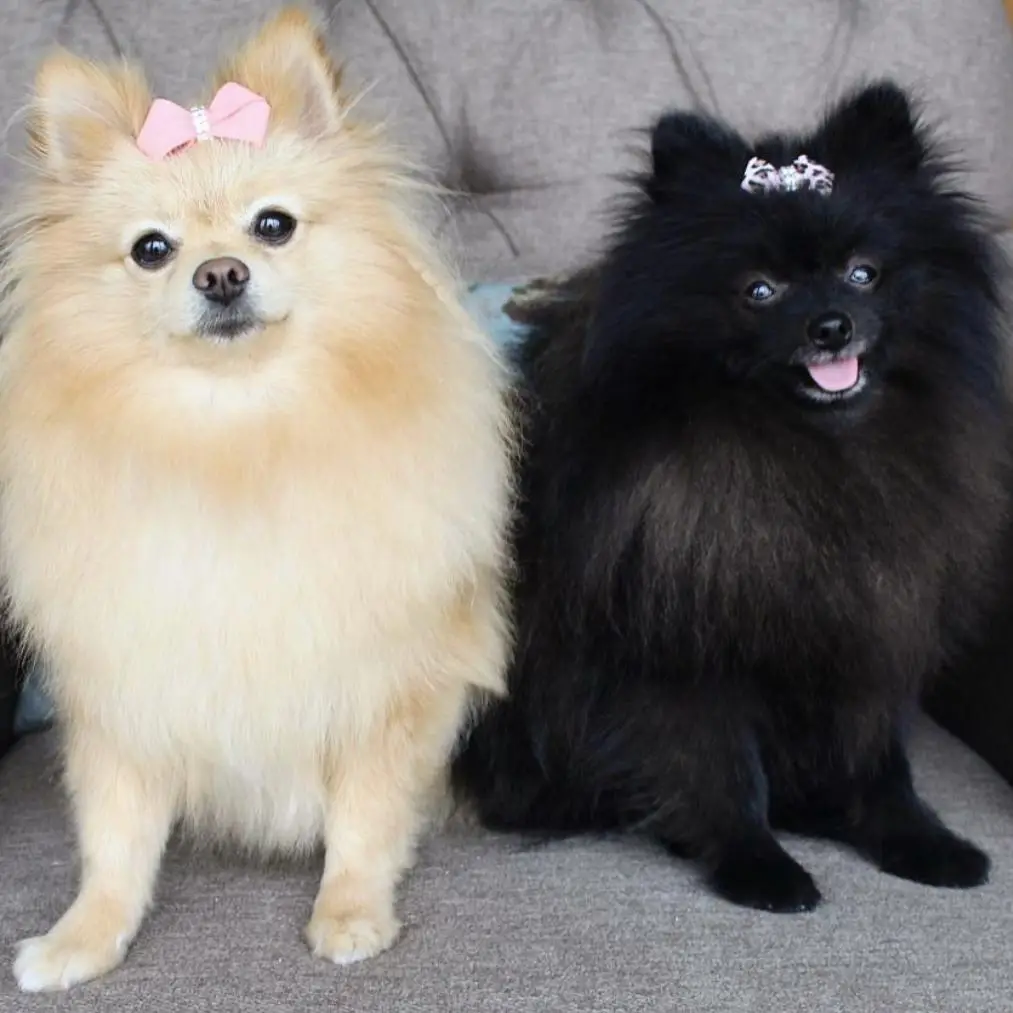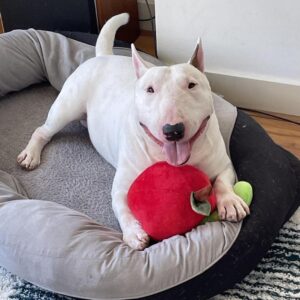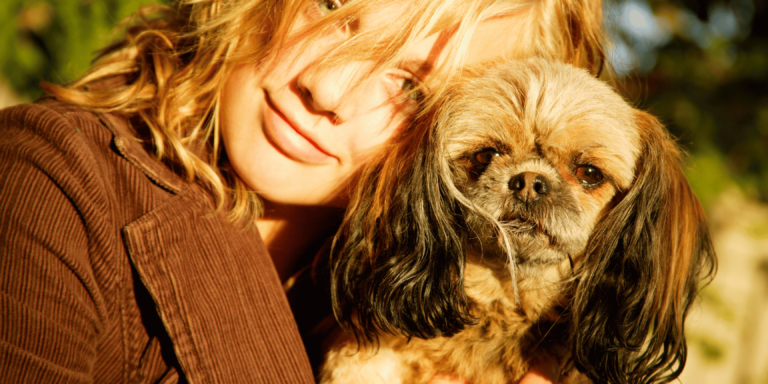What Are Pomeranians?
Pomeranians, oft einfach als „Poms“ bezeichnet, sind eine beliebte Hunderasse, die für ihre kleinen Größe, ihr flauschiges Fell und ihre lebhafte Persönlichkeit bekannt ist. Ursprünglich stammen sie aus der historischen Region Pommern, die heute zu Polen und Deutschland gehört.
About the Pomeranian
The Pomeranian breed belongs to the Spitz group and has its origins in the Arctic regions. They were originally bred as larger working dogs. Over time, they were selectively bred down to their current, much smaller size.
Pomeranians are small dogs with an average shoulder height of 20-30 cm and a weight of 1.5 to 3.5 kg. Their most striking feature is their dense, plush coat, which comes in a variety of colors, including orange, black, white, brown, and cream. They have a fox-like face with alert eyes and erect ears.
Pomeranians are known for their lively and playful nature. They are extremely curious, intelligent, and quick learners. Despite their small size, they have a big personality and can sometimes be a bit stubborn. They are very alert and tend to bark a lot, making them good watchdogs.
Caring for a Pomeranian requires regular brushing to minimize matting and shedding. Due to their dense coat, they tend to shed a lot, especially during coat changes. It is important to regularly clean their teeth, as small breeds are prone to dental issues.
Pomeranians are generally robust, but like all breeds, they have certain genetic predispositions. Common health issues include patellar luxation, heart problems, and tracheal collapse. Regular veterinary check-ups and a balanced diet are crucial for maintaining their health.
Pomeranians typically have a life expectancy between 12 and 16 years. This relatively long lifespan can be influenced by various factors, including genetic predispositions, lifestyle, diet, and overall care.
Living with a Pomeranian

The Benefits of Pomeranians
Pomeranians are charming and versatile dogs that offer many benefits. Due to their compact size, they are ideal for apartment and smaller house living. Their lively and friendly nature makes them great companions. Pomeranians adapt easily to different living situations and environments, making them highly adaptable. Thanks to their intelligence, they learn quickly and respond well to positive training. Despite their small size, they are alert and will notify you of strangers, making them effective watchdogs. With regular coat care and a balanced diet, their maintenance is manageable, and they remain healthy and happy. These qualities make Pomeranians wonderful family dogs and loyal companions.

1. Friendly and Lively Nature
Temperament: Pomeranians are known for their lively and friendly nature. They are curious and enjoy being the center of attention.
Social Dogs: They love spending time with people and are often very affectionate.
2. Adaptability
Living Environment: Due to their small size, Pomeranians are ideal for apartment and house living. They adapt well to different living situations.
Flexibility: Pomeranians can quickly adjust to new environments and routines.
3. Compatibility with Children
Playmates: Pomeranians can be great playmates for older children. They are playful and enjoy interactive games.
Caution with Small Children: Supervision is necessary with very young children, as Pomeranians might accidentally be injured due to their small size.
4. Easy Maintenance
Coat Care: Although they have a dense coat, grooming is relatively straightforward with regular brushing.
Health Care: Regular vet visits and a balanced diet help keep them healthy.
5. Trainability
Intelligence: Pomeranians are intelligent dogs that learn quickly. With positive reinforcement, they can be well-trained.
Obedience: They respond well to consistent training and clear instructions.
6. Alertness
Watchdogs: Despite their small size, Pomeranians are alert and will quickly alert you to the presence of strangers, making them effective watchdogs.
1. Walks
Regular walks are important to keep them fit and healthy. They love exploring new environments.
2. Playtime
Fetching and Hiding: Interactive games keep them physically and mentally active.
Chew Toys: Ideal for dental care and preventing boredom.
3. Brain Games
Puzzle Toys: Stimulate their intelligence and problem-solving skills.
Trick Training: They enjoy learning tricks such as rolling over and giving a paw.
4. Socialization
Dog Parks and Playgroups: Meeting other dogs improves their social skills.
5. Training Sessions
Obedience Exercises: Regular training promotes good behavior and strengthens the bond between you and your Pomeranian.
Trick Training: They love learning new tricks.
6. Indoor Activities
Ball and Tug Games: They can be active indoors as well.
Hide and Seek: Hiding treats or toys for them to find.
7. Quality Time with Owner
Cuddling and Bonding: They enjoy spending time with their owner, whether cuddling or just being together.
1. High-Quality Dry Food
Specifically for Small Breeds: Choose dry food formulated for small dog breeds. These formulations provide the right balance of proteins, fats, and carbohydrates.
Protein Content: High protein levels are essential for muscle development and maintenance. Poultry, beef, and fish are good protein sources.
2. Canned Food
Supplement to Dry Food: Canned food can be a tasty addition to dry food and helps increase fluid intake.
Varied Flavors: Vary the flavors to stimulate your Pomeranian’s appetite.
3. Fresh Fruits and Vegetables
Suitable Types: Carrots, apples (without seeds), blueberries, and pumpkin are healthy snacks that provide vitamins and fiber.
In Moderation: Fruits and vegetables should only make up a small portion of their diet.
4. Homemade Food
Balanced Recipes: If cooking at home, ensure recipes are balanced and contain all necessary nutrients.
Avoid Harmful Foods: Some foods like chocolate, grapes, onions, and garlic are toxic to dogs and should be avoided.
5. Treats
In Moderation: Treats should be used sparingly to avoid weight gain.
Healthy Options: Choose treats without artificial additives.
6. Special Diets
Allergies and Intolerances: Some Pomeranians may have food allergies or intolerances. Special diets may be required in these cases.
Veterinary Advice: Consult a vet to determine the best diet for your Pomeranian.
7. Regular Feeding Times
Small, Frequent Meals: Due to their small stomachs, Pomeranians benefit from several small meals a day.
Consistent Schedule: A regular feeding schedule aids digestion and prevents weight gain.
Training Pomeranian Puppies
Training Pomeranian puppies is crucial to ensure they grow into well-behaved and balanced adult dogs. Here are key aspects of training Pomeranian puppies:
People and Animals: Introduce your puppy to various people, dogs, and other animals to ensure they remain social and friendly.
Environments: Expose your puppy to different environments, such as parks, urban areas, and busy places, to get them accustomed to various noises and stimuli.
Reward desired behaviors with treats, praise, and toys. Positive reinforcement promotes faster learning and strengthens the bond between you and your puppy.
Beginne frühzeitig mit dem Gehorsamkeitstraining, um eine starke Bindung zwischen dir und deinem Welpen aufzubauen. Übe grundlegende Befehle wie „Sitz“, „Platz“, „Hier“ und „Bleib“.

Common Health Issues in Pomeranians
Pomeranians can be prone to several health issues that can affect their quality of life. Common issues include:
Patellar Luxation:
- Description: Displacement of the kneecap.
- Symptoms: Pain, limping, and movement problems.
- Treatment: Surgery may be required in some cases.
Tracheal Collapse::
- Description: Collapse of the trachea.
- Symptoms: Difficulty breathing, coughing, and hoarse barking.
- Treatment: Medications, weight management, and in severe cases, surgical intervention.
Heart Diseases::
- Description: Various cardiovascular problems.
- Symptoms: Fatigue, coughing, and breathing difficulties.
- Treatment: Regular veterinary monitoring and medication.
Dental Issues::
- Description: Tartar buildup and gum disease.
- Symptoms: Bad breath, difficulty chewing, and tooth loss.
- Treatment: Regular teeth cleaning and appropriate dental care products.
Careful attention and regular veterinary check-ups are essential to manage these health challenges and ensure the well-being of a Pomeranian.












